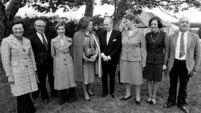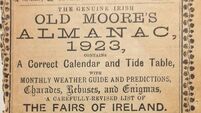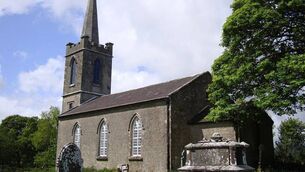The long-forgotten British PM with firm roots in East Mayo
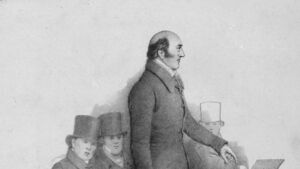
March 1826: British statesman, George Canning (1770-1827) speaking in the House of Commons. (Photo by Hulton Archive/Getty Images)
Although Ireland’s history with its closest neighbours has often been fraught with tension and distrust, the primary resident at 10 Downing Street has often had strong ties to the island. Indeed, two former prime ministers were born and reared on the island of Ireland before they left to pursue their political ambitions across the Irish Sea in Whitehall.
William Petty-Fitzmaurice, styled as the 1st Marquess of Lansdowne and the 2nd Earl of Shelburne, was the first Irish-born politician to hold the office when he assumed the role in 1782. His tenure was short - albeit an eternity by today’s standards with the prime minister being replaced more often than the bed sheets on Downing Street - lasting only 10 months which he largely put down to a less-than-civilised upbringing in Kerry. His education was neglected, he felt, from being exposed to such uncouth surroundings in the south of Ireland, although he was born within the Pale in Dublin.
He nevertheless retained links with the county into adulthood, building Shelburne Lodge in 1769 around which the town of Kenmare was established over the following decade. The house still stands today and has been converted into a guesthouse at the edge of the town where tourists can visit and flavour the lifestyle Petty was afforded in the mid-18th century.
His time in office coincided with the American War of Independence, with history subsequently judging him reasonably well. His efforts in pursuit of peace with rebels on the far side of the Atlantic laid the groundwork that led to the signing of the Treaty of Paris which was signed in late 1783. The opposition however, as it so often their wont, didn’t look upon his efforts with the same appreciation and, by the time the treaty was signed, Petty-Fitzmaurice had been removed from office.
Despite his short tenure in office, British politicians were happy to entrust the responsibility of the highest office in the land to another Irish-born member of the House of Commons a couple of decades later. Arthur Wellesley, styled as the 1st Duke of Wellington and the 1st Earl of Mornington, was first appointed as Prime Minister in 1828 just as Daniel O’Connell was gaining momentum in his campaign for Catholic emancipation.
A year after he assumed the position, Wellesley determinedly found a way to get the Catholic Emancipation Act over the line, but it wasn’t without some adept persuading of some of his ultra-conservative peers and King George IV, no less. It required peerless levels of adroit coaxing to achieve what many would have felt was unachievable at the time, though there was also a sharp ruthless edge to his manner. On one occasion when his words simply weren’t enough, he fought a duel with George Finch-Hatton, the 10th Earl of Winchilsea and one of his harshest critics, at Battersea Fields in south London.
But there have been a number of other prominent British politicians with strong Irish roots such as George Canning who assumed the office shortly before Wellesley rose to the challenge. Both men were in fact great rivals within the same party, despite their similarly strong ties to Ireland.
Both of Canning’s parents, George Canning Sr and Mary Ann Costello were born in Ireland. Canning Sr came from Derry, moving over to England in search of a better life where he met and married Costello who is believed to have been born in Caher, a townland near Aghamore in East Mayo. Her father, Jordan Costello, was known as a Connacht squire.
And yet for all Canning’s feats within the institution they refer to as the Mother of Parliaments, it is perhaps his mother who had the most interesting story to tell. For though her son was brought up in the pampered luxury of high society, she spent most of her life in destitution and desperately beating away the clutches of poverty. Costello became an orphan at an early age and was reared by her grandfather in London. She married Canning Sr in 1768 and, two years later, she gave birth to a future prime minister, George Canning Jr. But grief remained an omnipresent force in her life. Her first child died a couple of months after birth and her first husband, Canning Sr, died within a couple of months after her second child, the future prime minister, was born. It left the Mayo native with no income and little family who could offer the financial support she needed in her time of need.
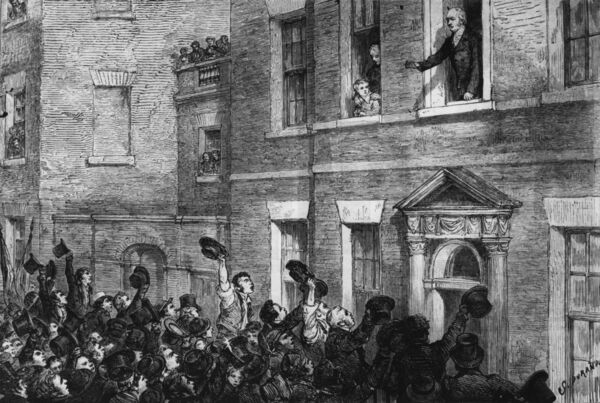
The situation forced her to head out into the world in search of a steady income. She decided on acting as a career choice. Her talent, however, wasn’t deemed of a sufficient standard for London’s most prestigious venues so, over the following years, she travelled around the country performing in small venues that were never going to garner her much fame or immense riches. After a number of years scraping by on a very modest income, it was decided that her nomadic lifestyle was far from an ideal setting from which to raise a child so her son was placed in the care of a uncle, Stratford Canning, who had the financial means not only to support his nephew but to give him an education that would pave the way towards the corridors of power in Westminster.
While his mother travelled the country in relative poverty, Canning was attending Eton College and Christ Church in Oxford. Not only that, he was being singled out as a young man with a great degree of potential. One of those who spotted this potential was William Pitt the Younger, the second-longest serving prime minister in history, who took the aspiring politician under his wing and endeavoured to find him a seat in parliament.
During much of this time Canning had no contact with his mother who had since met another partner, Samuel Reddish, a theatre manager with whom she had five more children. The relationship eventually ended, but Costello soon moved on. She then met and married Richard Hunn, with whom she had five more children. Canning meanwhile continued his education which helped him build the foundation necessary to become an MP for Newtown on the Isle of Wight in 1793, quickly becoming a young talent to be reckoned with on the backbenches under the careful tutelage of his mentor, the Prime Minister.
By 1807 Canning had risen through the ranks of the Tory Party to become the Foreign Secretary in the government of William Cavendish-Bentinck, the 3rd Duke of Portland, and was becoming a turbulent presence within political circles. During this time he established quite a bitter dispute with the Secretary of State for War and the Colonies, Robert Stewart, known as Viscount Castlereagh, who also happened to be an Irish-born Tory politician. At one point he even challenged his contemporary in a duel that ultimately left Canning with a thigh wound. The unsavoury incident left Canning on the political sidelines for a period, but it didn’t hinder his future political ambitions.
Understandably perhaps, he wasn't universally liked among his peers. He was a leading advocate for Catholic emancipation, he clearly boasted a feisty temperament and, rather unfairly, his unprivileged upbringing as the son of a travelling actress who didn't always interact with the most respectable company was used as a stick to beat him. His eventual appointment as Prime Minister triggered over 40 party resignations from within his own party.
As Canning was attempting to forge his way to the highest political office in the land, his mother was still travelling around the country making a living in theatres with almost a dozen children in tow. Her lifestyle increasingly became a liability for her son's political ambitions, but he nevertheless supported her and her large family, despite political opponents often pointing to her and reasoning that any offspring of hers must surely be unfit for office. The future prime minister, it was argued, should come from a more respectable background, ignoring the esteemed education his uncle had provided.
Costello's relationship with Hunn eventually ended, at which point she decided to retire from performing on stage. As she entered her later years, she wasn’t kept at the same distance from her son. He warmed to her and, as time passed, she was afforded the opportunity to foster relationships with her grandchildren. Canning had married a woman named Joan Scott, with whom he had four children.
As his mother returned to become a greater presence in his life, Canning was also performing well in his role as Foreign Secretary and, upon the resignation of Robert Jenkinson, the 2nd Earl of Liverpool, as Prime Minister, it was decided that no government could be put together without the Foreign Secretary's support. And it soon became obvious that there was only one way in which his support could be shorn up.
On April 20, 1827, after almost three-and-a-half decades in politics, Canning was finally appointed as Prime Minister. Unfortunately, his premiership ended prematurely later that year when he died in office. His tenure in office, lasting only 119 days, was the shortest in history until earlier this year when Liz Truss left the job after 50 days. Though his time in office was short, it highlighted the disdain with which the upper classes of British society viewed lower classes. Despite his education and clear political ability, Canning never truly earned membership into the privileged upper class circle of his peers, his mother’s lifestyle and playing no small role in the contemptuous mindset that looked upon him as an outsider.
Charles Grey, the 2nd Earl Grey, was one of the most trenchant critics of Canning’s background, referring to “the son of an actress as incapacitated de facto for the premiership of England”.
But the man who personally referred to himself as an Irishman who was “accidentally born in London” eventually rose above it all.
Unfortunately for Costello, she never lived to see the day when her son was appointed to the highest political office in the land, passing away just over a month before her son assumed the role.
